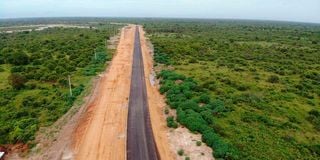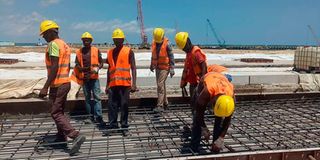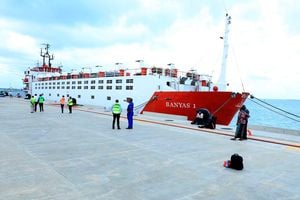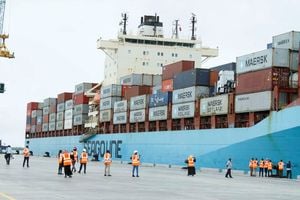
The Ariel View of the Hindi-Junction to Kililana’s Lamu Port site access road under construction in 2020. The Lapsset Corridor Access Road has failed to make meaningful progress owing to frequent al-Shabaab attacks that have left scores of construction labourers on the project dead.
The Sh17.9 billion Lamu-Ijara-Garissa Lapsset Corridor Access Road has failed to make meaningful progress owing to frequent al-Shabaab attacks that have left scores of construction labourers on the project dead.
At least 16 people working on the project have lost lives at the hands of the terrorists while another 40 were left with permanent injuries between 2021 and to date.
They include casual labourers, supervisors and their foremen.
A Chinese contractor who lost his hand from a terrorist gunshot is among the victims.
The al-Shabaab attacks have also left construction equipment worth over Sh200 million destroyed after they were torched.
They include trucks, excavators, bulldozers, tippers, and rollers among others.
The road construction project was launched in April 2021 after the Kenyan government through the Kenya National Highway Authority (KeNHA) inked a deal worth Sh17.9 billion with China Communications Construction Company (CCCC).
The road, which is part of the Lamu Port-South Sudan Ethiopia Transport (Lapsset) corridor project, was supposed to take two years (24 months) with the end or completion date being May 2023.
The transport project involves the construction of a 453-kilometre road.
The construction comprises 257 kilometre Lamu-Ijara-Garissa section, which is part of the Lapsset project as well as the Hindi-Bodhei-Basuba-Kiunga section which spans 113 kiloemtres and the Ijara-Sangailu-Hulugho section which extends 83 kilometres.
All sections cut across the terror-prone Boni forest that straddles almost three counties of Lamu, Garissa, and Tana River. Shortly after the project started in April 2021, numerous al-Shabaab attempts, attacks and killings involving improvised explosive devices (IEDs), landmines, rocket-propelled grenades and gun attacks were orchestrated, resulting in the contractor to suspend works from time to time.
On January 23, 2022, for instance, eight construction vehicles and other equipment belonging to the CCCC firm were burnt when heavily armed al-Shabaab militants ambushed a construction site at Kwa Omollo Bridge, near Bodhei-Junction in Lamu’s Boni forest.
This forced the contractor to suspend the road construction works for over two months owing to the rising cases of ambushes.
Days after construction resumed, al-Shabaab, again, attacked a mini-construction site in the Majengo area, also within Boni Forest, and killed at least five construction workers and left several others injured.
The site is about seven kilometres from Kwa Omollo Bridge where the January 23 attack was orchestrated.
During the Majengo Area attack, the assailants also burnt down construction vehicles and several motorcycles belonging to casual labourers.
The attack was conducted on March 11, 2022.
The move also led the contractor to withdraw all its workers from the project site as a way of compelling the government to reassure them of their security.
The work later resumed in May, 2022.
In January 2023, four people were killed after the vehicle they were travelling in hit an IED on the Lapsset road in Bura East, Tana River County.
Three of the victims were KeNHA staff, including engineers.
They were in a convoy of three vehicles who were on routine assessment of the Lapsset road before they were attacked by a suspected al- Shabaab who had placed an IED on the old Lapsset road which exploded, destroying the first vehicle.
In December 2023, four people were killed and two others wounded in a roadside blast launched by al-Shabaab militants within Lapsset Corridor access road in Garissa County.
The recurrent attacks that were being unleashed by the terrorists in various parts of Northern Kenya, targeting Lapsset-related projects, scared away the contractor of the Lamu-Ijara-Garissa Lapsset corridor access road.
Workers were, again, ordered to vacate their respective construction sites.
After months of consultations and security intensification, the contractor brought his workers back in early February 2024.
The contractor has, however, kept on fleeing the construction site owing to a behavior by the Al-Shabaab militia to spread letters, threatening to conduct yet other attacks targeting Lapsset Road and other related projects.
A casual labourer on the ground, who talked to the Nation on condition of anonymity said currently, no work is taking place on the site.

Lapsset workers on site in Kililana in Lamu West in 2018.
“We resumed work this February. The Chinese contractor stopped the works temporarily claiming to be attending the Chinese New Year. Since then, he hasn’t come back. Before vacating, there was a threatening letter going round about al-Shabaab plans to attack Lapsset roads and related projects. We’re over 400 casual labourers stranded here. We suspect the insecurity incidents are making the contractor reluctant to return to the site,” said the labourer.
Willy Charo, a construction worker, lauded the State for tightening security in Boni Forest, especially the areas that the Lapsset corridor access road cuts across.
Mr Charo says he is confident his security is well taken care of.
“That’s why I came all the way from Witu to look for a job here. Kenya Defense Forces (KDF) have taken full charge. They’re always patrolling. We call on the contractor to come back to enable us to continue with the job and earn income to sustain our families,” said Mr Charo.
From the numerous incidents of works being suspended and delayed, it is clear that the al-Shabaab insurgents have brought lots of inconveniences, including derailing the works for the road project that was supposed to take only two years to be completed.
The project is already 10 months behind schedule. Since the construction started in 2021 to date, a total of Sh9.8 billion, which is over half the budget for the entire project, has been spent without any significant mileage being covered as far as completion of the road goes.
The Nation established that by June 2023, the road works were at 53.4 per cent completion.
In what is viewed as a blow to the contractor, however, construction experts hit the ground and conducted an assessment of the then-completed section of the road only for it to be found to be shoddy and generally substandard. The contractor was, therefore, compelled to repeat the work, though without any extra pay, a situation which is now frustrating the project even more.

A lorry that was damaged by an explosive on January 17, 2023 along the LAPSSET project. Construction works on the project have been suspended due to an increase in terror incidents.
The government also changed some of the initial experts, including the resident engineer in July, 2023 before the work started afresh.
Apart from insecurity, the Nation also established that there have been delays in disbursement of the project funds, a factor that has also affected the project works and even caused supervision and construction frustrations.

Kenya National Highways Authority (KeNHA) Director General, Peter Mundinia and Li Changgui, the General Manager China Communication Construction Company Limited after signing the Sh17.9 billion tender award agreement in Nairobi on Monday.
During an interview with the Nation on Thursday, the current resident engineer in charge of the Lamu-Ijara-Garissa Lapsset Corridor Access Road, Willis Ingari confirmed to have approved only 200 metres of the road works so far being undertaken afresh.
“The 200 metres stretch is just the trial section of the road. I have now given a go-ahead to the contractor to proceed with the works that way unlike what they had done previously. What they did is nothing but a waste,” said Mr Ingari.
He admitted that insecurity attributed to al-Shabaab attacks is a major threat to the completion of the project.
The residents engineer was, however, quick to laud the state for boosting security in all the Lapsset corridor-related projects.
He called on the contractor to be committed and to put extra effort in his work, something that he believes will enable the project to progress well and be fast-tracked.
Mr Ingari highlighted some strategies they have put in place to ensure safety, smooth progress of the project and protection of the construction equipment and the workers on the ground.
“We decided that we shall be constructing the road in five -kilometre sections each to full completion before moving to the next five kilometres until we finish the entire 453-kilometres road. This will help our security officers to concentrate or focus on protecting us at the one point we will be working on before moving to the next. No need to parade our construction equipment and workers by having several construction sites,” said Mr Ingari.












